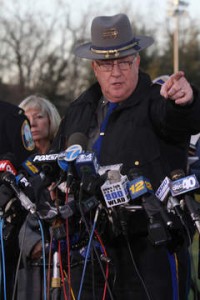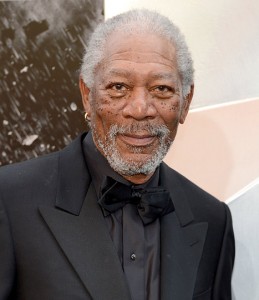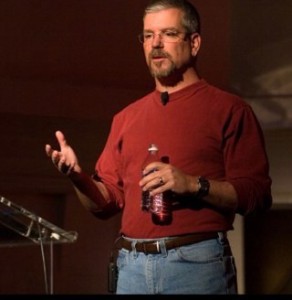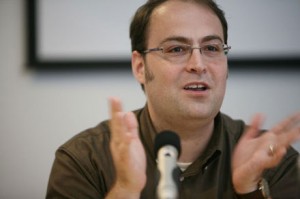 |
| J. Paul Vance (AP Photo) |
The opening segment of CBS’s “60 Minutes” looked at the tragedy in Newtown and noted the fact that early reports, spread initially through social channels and eventually via mainstream media, were false. No, the killer’s mother didn’t teach at Sandy Hook elementary school, and no, it wasn’t Ryan Lanza, but his brother Adam who was the shooter.
The amount of misinformation wafting from online to offline to general acceptance was so rampant, an exasperated Lieutenant J. Paul Vance of the CT State Police, in his weekend presser, threatened those posting on “social sites” with legal prosecution or arrest. I found that curious as did Matt Williams writing for The Guardian from New York:
“Vance noted that in some cases, people had set up social media accounts purporting to belong to the gunman or other people connected to the case. ‘It has been threatening, it has been inaccurate, it has been people posing as other people,’ Vance said. Perpetrators ‘could be subject to arrest, he added. Twitter has suspended a number fake accounts that were set up in the aftermath of Friday’s shooting: @Pray_Newtown has also been suspended, after Twitter users complained that it was posting pictures of victims of other gun massacres.”
 |
| Morgan Freeman (Stephen Lovekin/FilmMagic) |
Today we learn about another Newtown-related hoax that ensnared actor Morgan Freeman and spread quickly on Facebook and Twitter. From Mashable:
“An alleged statement attributed to actor Morgan Freeman in the wake of the Newtown, Conn., school shooting that left 20 children and 6 adults dead has been deemed a hoax. The comments — which went viral this weekend on sites such as Facebook and Twitter — condemned the ‘sensationalist media’ for coverage of mass killings, blaming news outlets for making “disturbed people” want to kill themselves in a ‘memorable way.'”
It’s one thing for a bot to serve up some tasteless search-driven ad, as was the case with Amazon:
Really Amazon!? Really!?! I think your bidding logic is a little flawed and a little creepy. twitter.com/justinschoen/s…
— Justin Schoen (@justinschoen) December 14, 2012
And Google:
Thanks Google for sending out this daily deal for handgun shooting today #insensitive twitter.com/LianaBaker/sta…
— Liana B. Baker (@LianaBaker) December 15, 2012
But, it’s entirely a different story for poseurs to create real-sounding identities in social and MSM channels for the purposes of spreading false and malicious information. (Gee, sounds like Karl Rove and the GOP during this last election.) Be that as it may, the First Amendment does grant the freedom to express one’s opinion, however heinous that opinion may be.
 |
| GigaOm’s Mathew Ingram |
Twitter and Facebook’s terms-of-service also provide some parameters for participation in their ecosystems. I don’t know under which law Lt. Vance can prosecute those on FB and Twitter. As GigaOm’s astute observer of all things media Mathew Ingram noted in his timely post, “It’s not Twitter — this is just the way the news works now”:
“Is social media responsible for these mistakes? Hardly. Most of them were reported by CNN and other traditional news sources as well, and in many cases Twitter users simply repeated them. Should they have verified the information before repeating it, as so many Twitter critics advise users to do? It’s hard to see how they could have done so, even if they wanted to. And to ask people to stop using Twitter or other social media during such an event seems naive at best — for better or worse, social networks are a crucial part of how we communicate now, and how we share both information and our emotional reaction to events like the Newtown shooting.”
 |
| NPR’s Andy Carvin |
Unfortunately, early news reports invariably are fraught with errors. Couple this with socially engaged amateurs amplifying these raw, unverified accounts and you have a significantly flawed first write of history. There isn’t a quick fix for this. Breaking news is almost always cacophonous and confusing. Ingram cites NPR’s Andy Carvin as someone who takes time to validate his social sources before amplifying verifiable information via his Twiterstream. But he works for the venerated NPR. Ingram concludes:
“One way to do this is for journalists both pro and amateur to shift their skillset from simply reporting facts to assembling and/or fact-checking them, using the crowd for assistance as Carvin has, and focusing on the kind of approach taken by the BBC’s “user-generated content†desk and other innovative approaches to the process. In the end, we could wind up with not just a new way of building the news, but a dramatically better one.”
Also, let’s not discount the importance of creating awareness and a healthy skepticism about the veracity of the information that crosses one’s social streams. In other words, don’t believe everything you read. Consider the source!
Nice poem, just show the creativity.
Twinkle Twinkle Little Star, which you made Twinkle Twinkle Tweeter Star. Nice post, thanks for share this.